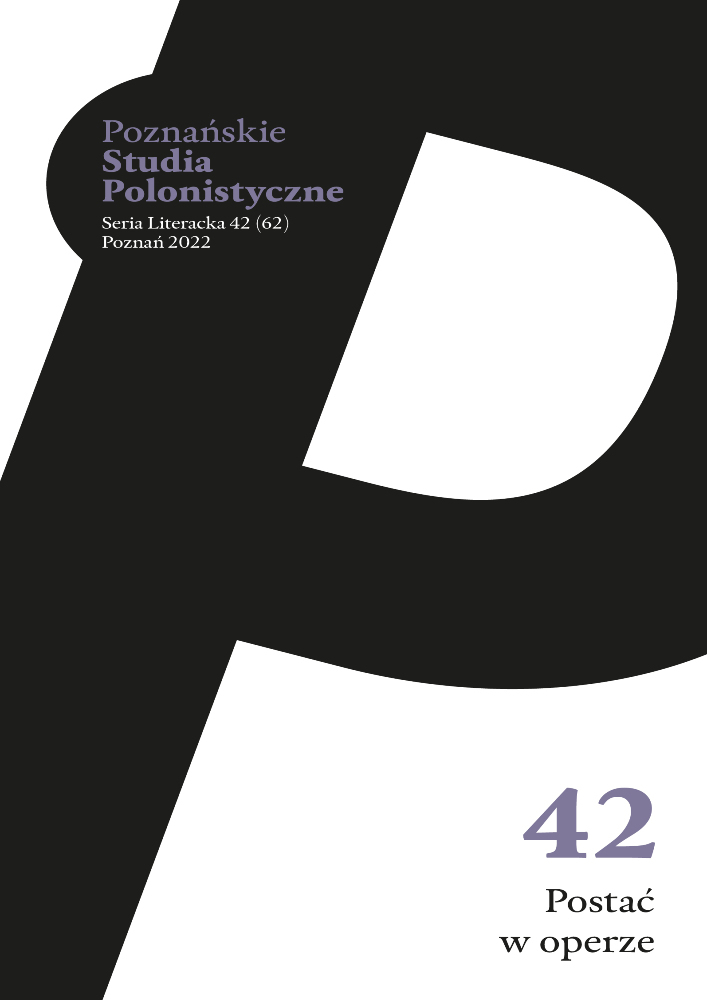Abstract
This article is devoted to the characters in Heinz Holliger’s opera Snow White (1998) based on Robert Walser’s dramolette (1901) of the same title. Taking into account the chronology of the plot, the analysis and interpretation focuses on the evolution of the relationships of the characters struggling with the baggage of a difficult past written in the Grimms’ fairy tale. Snow White, the Queen, the Prince and the Huntsman juggle with each other’s versions of events, swapping positions at the expense of the characters’ individual contours, succumbing to the changeability of their feelings and opinions, not stopping in their search for a post-tale identity which would allow them to coexist harmoniously. The discussion emphasises the psychoanalytical approach and criticism of language characteristic of the period in which the dramolette was written. The interpretation of the libretto is complemented by the presentation of selected musical aspects, corresponding with the character of Walser’s text and determining the final meaning of the operatic work.
References
Benjamin Walter (1991), Robert Walser, w: tegoż, Gesammelte Schriften, t. 2, red. Rolf Tiedemann, Hermann Schweppenhäuser, Suhrkamp, Frankfurt am Main, s. 324–328.
Bettelheim Bruno (1996), Cudowne i pożyteczne. O znaczeniach i wartościach w baśni, W. A. B., Warszawa.
Brotbeck Roman (2000), Zur Oper „Schneewittchen” von Heinz Holliger, w: Heinz Holliger Schneewittchen, CD booklet, ECM Records, s. 22–33.
Gisi Lucas Marco, red. (2015), Robert Walser-Handbuch. Leben – Werk – Wirkung, J. B. Metzler, Stuttgart, https://doi.org/10.1007/978-3-476-05303-9.
Greven Jochen (2016), Robert Walser. Figur am Rande, in wechselndem Licht, Fischer Taschenbuch, Frankfurt am Main.
Grimm Wilhelm i Jakub (2010a), Baśnie dla dzieci i dla domu, t. 1, przeł. Eliza Pieciul-Karmińska, Media Rodzina, Poznań. (Skrót: KHM)
Grimm Wilhelm i Jakub (2010b), Królewna Śnieżka, w: tychże, Baśnie dla dzieci i dla domu, t. 1, przeł. Eliza Pieciul-Karmińska, Media Rodzina, Poznań, s. 272–282.
Herzog Urs (1974), Robert Walsers Poetik. Literatur und soziale Entfremdung, Max Niemeyer, Tübingen, https://doi.org/10.1515/9783111390062.
Holliger Heinz, Walser Robert (1999), Schneewittchen. Oper nach Robert Walser, Textbuch, Texteinrichtung vom Komponisten (1997/98), Schott Musik International, Mainz.
Hübner Andrea (1995), Ei’, welcher Unsinn liegt im Sinn? Robert Walsers Umgang mit Märchen und Trivialliteratur, Stauffenburg, Tübingen.
John Johannes (2014), Reclams Zitaten-Lexikon, Reclam Verlag, Stuttgart.
Kampe Gordon (2012), Topoi, Gesten, Atmosphären. Märchenoper im 20. Jahrhundert, Pfau, Saarbrücken.
Kunkel Michael, red. (1999), Heinz Holliger „Schneewittchen” (1997/98), Pfau, Saarbrücken.
Minden Gerald von (1978), Der strukturell ich-gestörte Patient und die Theorie der Objektbeziehungen, „Zeitschrift für Psychosomatische Medizin und Psychoanalyse”, vol. 24, nr 4, s. 328–354.
Walser Robert (1901), Schneewittchen. Komödie in Versen, „Die Insel”, nr 12, s. 265–307.
Zimmermann Heidy (2014), Holligers Walser. Der Komponist und sein Dichter, Paul Sacher Stiftung, Basel.
License
Authors
Authors of texts accepted for publication in „Poznańskie Studia Polonistyczne. Seria Literacka” are required to complete, sign and return to the editor's office the Agreement for granting a royalty-free license to works with a commitment to grant a CC sub-license.
Under the agreement, the authors of texts published in „Poznańskie Studia Polonistyczne. Seria Literacka” grant the Adam Mickiewicz University in Poznań a non-exclusive, royalty-free license and authorize the use of Attribution-NoDerivatives 4.0 International (CC BY-ND 4.0)Creative Commons sub-license.
The authors retain the right to continue the free disposal of the work.
Users
Interested Internet users are entitled to use works published in „Poznańskie Studia Polonistyczne. Seria Literacka” since 2016, for non-commercial purposes only, under the following conditions:
- attribution - obligation to provide, together with the distributed work, information about the authorship, title, source (link to the original work, DOI) and the license itself.
- no derivatives - the work must be preserved in its original form, without the author's consent it is not possible to distribute the modified work, such as translations, publications, etc.
Copyrights are reserved for all texts published before 2016.
Miscellaneous
Adam Mickiewicz University in Poznań retains the right to magazines as a whole (layout, graphic form, title, cover design, logo etc.).

